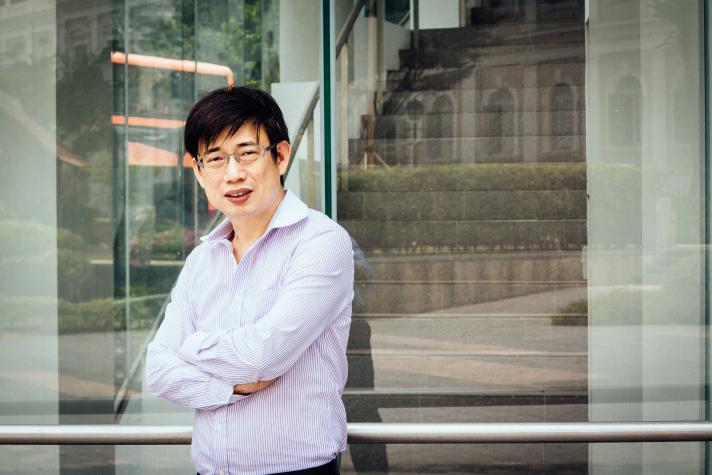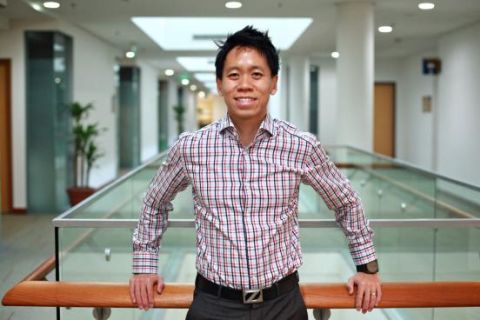
Associate Professor Lim Chee Yeow of the SMU School of Accountancy is studying whether the provision of non-audit services affects the independence of auditors and the quality of their audit work.

Photo Credit: Darren Yau
By David Tan
SMU Office of Research (21 Feb 2014) – Since the spectacular collapse of Enron in 2001 and subsequently their audit firm Arthur Andersen, audit companies have faced increasing pressure to remain unbiased and independent of their clients. However, a growing public concern is the impact of non-audit services offered by audit firms on their independence.
Non-audit services include compliance-related services such as taxation and accounting advice, as well as assurance-related services such as due diligence, explains Associate Professor Lim Chee Yeow of the Singapore Management University (SMU) School of Accountancy. “The profit margin of non-audit services is much higher than for audit work, and in the United States (US), audit firms earn much more from non-audit services than from audit services,” he says.
Because of this, regulators are increasingly concerned that provision of non-audit services could end up compromising auditor independence, and US regulators have even moved to ban the provision of certain non-audit services by auditors.
Professor Lim is interested to find out if this ban is indeed warranted. He describes a key question of his research, “Does the provision of non-audit services, particularly by the expert auditors, affect the independence of auditors and the quality of their audit work?”
Non-audit services and audit independence
He outlines two opposing points of view. On the one hand, auditors attracted to the lucrative income from non-audit services may give in to client demands, thus compromising their independence. “Bonding between the auditor and the client could become too close, particularly with the provision of non-audit services,” Professor Lim says.
On the other hand, by providing non-audit services, auditors may get a deeper understanding of the firm they are auditing. “Conversely, non-audit services allow the audit firm to better understand the client, their operations and their business model, which means they are better able to audit the company. This is known as the knowledge spillover effect,” he says.
To find out which hypothesis was backed by data, Professor Lim examined audit-related data available from the Audit Analytics database. He first identified ‘expert auditors’ in a wide range of industries, defined by the market share within their respective industries. “Expert auditors care very much about their reputation and about their exposure to potential litigation. These firms also have deep knowledge about their industry norms and accounting rules.”
Professsor Lim explains that several other studies have found no relation between the provision of non-audit services and audit quality. However, he discovered in his research that for these companies, the provision of non-audit services by the expert auditors led to an increase in the quality of their audit.
He also examined how auditor quality matters in countries with varying levels of investor and legal protection. This is particularly important for companies and investors interested in putting money into developing countries where the legal environment may be weak. To address this issue, he examined discretionary accruals, a common financial reporting measure of audit quality.
“We found that when the legal environment is strong, when investors are already well protected, the auditor quality is not that important. But when the legal environment and investor protection is weak, the benefit of hiring the best quality auditors is highest.” He explains that this meant companies moving into developing countries would do well in engaging a higher quality auditor.
The impact of national culture on financial reporting
While formal institutions such as a strong legal system affect accounting and audit practices, Professor Lim is also interested in how informal institutions such as national culture may affect the financial reporting. “The reason why I’m interested in the ‘softer’ aspects of this field is because there haven’t been many studies in this area and because culture is intangible and difficult to measure.”
He looked at differences in culture and how these affected accounting conservatism as well as risk-taking behaviour. He used two measures of cultural differences developed by Dutch social psychologist Geert Hofstede: firstly, individualism or how individualistic a person or a society is, and secondly, uncertainty avoidance, which refers to appetite for risk.
“Our hypothesis is that if a society is more individualistic, then risk-taking increases and financial reporting is less conservative. If uncertainty avoidance is high, risk-taking decreases and financial reporting is more conservative.” Professor Lim said that overall, the data examined was consistent with their hypothesis, showing the importance of culture on accounting and risk.
“Our work shows that financial reporting is affected not only by formal institutions but informal institutions also have first-order effects on aspects such as risk-taking and accounting conservatism,” he says.
“Following the financial crisis, many regulators are now concerned about risk-taking. The thinking is to have more regulations to prevent banks from being too aggressive in taking risks. But our research shows that apart from formal measures to control risk-taking, fundamental cultural aspects play an important role in determining risky behaviour. Regulation is not everything.”
Following on from his work into the link between national culture and financial reporting, Professor Lim is studying the correlation between social trust and tax avoidance. He draws data from the World Values Survey, a global project that measures trust between people as well as trust between citizens and the government, and how they change over time.
“Tax avoidance is a particularly important issue because regulators are concerned about the loss to government revenue. Our basic finding is that if trust is high within the society, managers are likely to conform to social norms and refrain from actions that may betray the trust placed on them by society, so they are more likely to pay their share of taxes,” he says.
Professor Lim currently collaborates with several colleagues in the SMU School of Accountancy, including Assistant Professor Goh Beng Wee, Assistant Professor Jimmy Lee and Associate Professor Zang Yoonseok. When asked about future potential collaborations, Professor Lim says he sees several similarities and overlap between his work and that of colleagues at the Lee Kong Chian School of Business. “It would be good to tap on their expertise there!”
See More News
Want to see more of SMU Research?
Sign up for Research@SMU e-newslettter to know more about our research and research-related events!
If you would like to remove yourself from all our mailing list, please visit https://eservices.smu.edu.sg/internet/DNC/Default.aspx

